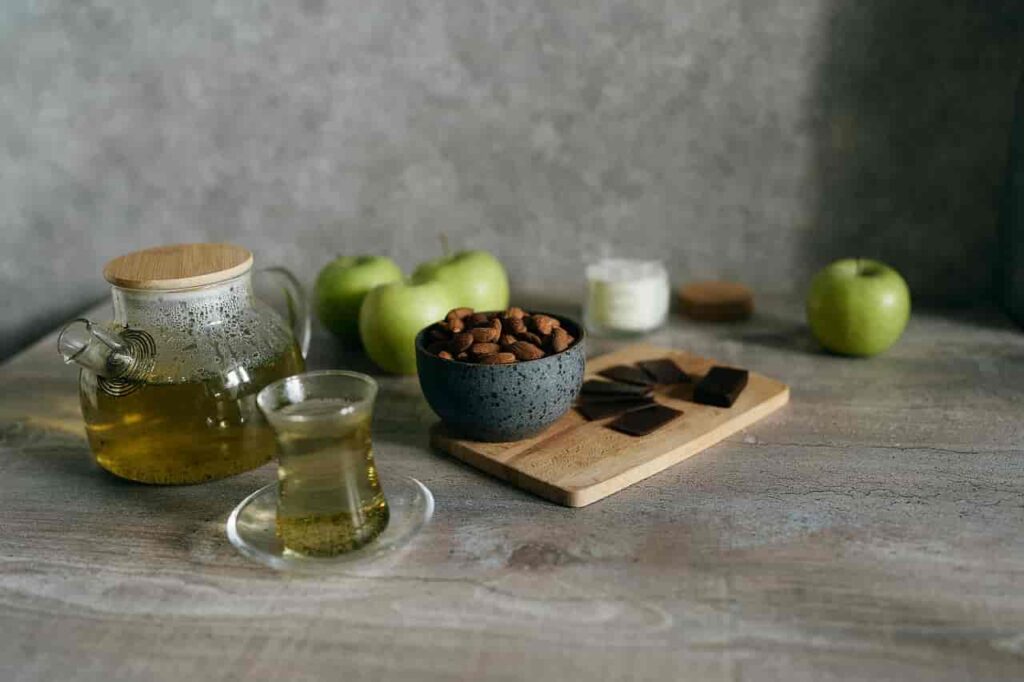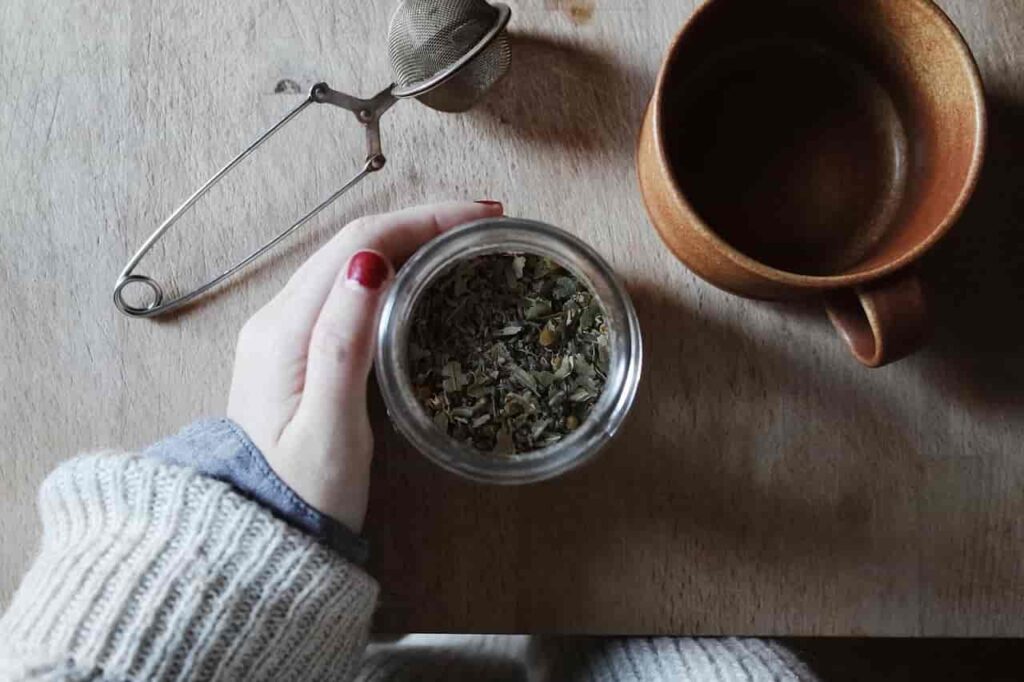Is Green Tea Safe During Pregnancy? Quantities + Types

Drinking Green tea during pregnancy is moderate; it is recommended to exercise caution in your intake. Green tea contains caffeine, albeit in smaller amounts than black tea or coffee. High caffeine intake during pregnancy may be associated with an increased risk of certain complications, such as low birth weight or preterm birth. Therefore, it is advisable to limit your green tea consumption when you are pregnant.
What is Green Tea?

Green tea is a type of tea that is made from the leaves of the Camellia sinensis plant. It is known for its vibrant green color and unique flavor. Unlike other types of tea, such as black tea or oolong tea, green tea undergoes minimal oxidation during processing. This preservation of its natural compounds, including catechins and antioxidants, contributes to its potential health benefits. Green tea is popularly consumed worldwide and is often praised for its refreshing taste and potentially positive effects on overall well-being.
Green tea is predominantly grown in several countries, with the primary origins being China, Japan, and India. These countries have ideal climates and conditions for cultivating the Camellia sinensis plant, from which green tea is derived.
Is Green Tea Good for You?
During pregnancy, it is advisable to consume green tea in moderation. Opt for decaffeinated options and avoid drinking them with meals or alongside.
Can Green Tea cause Miscarriage?
There is limited to suggest that moderate consumption of green tea is linked to an increased risk of miscarriage. However, excessive caffeine intake, including from green tea, has been associated with potential risks during pregnancy.
Benefits of Green Tea During Pregnancy

Here are the potential benefits of consuming green tea during pregnancy:
1. Antioxidant support
Green tea is rich in antioxidants that help protect against oxidative stress and support overall health during pregnancy.
2. Boosts immune system:
The antioxidants present in green tea help strengthen the immune system, reducing the risk of common illnesses.
3. Calming effect
Green tea contains theanine, an amino acid that can promote relaxation and reduce stress levels, which can be beneficial during pregnancy.
4. Hydration
Green tea can contribute to your daily fluid intake, helping you stay hydrated.
5. Digestive aid:
Some compounds in green tea, such as catechins, may have a mild digestive effect, supporting healthy digestion during pregnancy.
6. Oral health
Green tea has been associated with improved oral health due to its antibacterial properties, which can help combat dental issues during pregnancy.
7. Skin health
The antioxidants in green tea may contribute to maintaining healthy skin and reducing the appearance of specific skin issues during pregnancy.
8. Heart health support
Green tea consumption has been linked to improved cardiovascular health, including maintaining healthy blood pressure levels.
9. Variety of flavors
Green tea comes in various flavors and blends, providing a refreshing and enjoyable beverage option for pregnant women seeking a change from plain water.
Is Green Tea Safe in Every Trimester?
Green tea is generally considered safe to consume in moderation during pregnancy. However, it’s essential to exercise caution and follow these guidelines:
First Trimester: Limit your green tea intake during the first trimester due to its caffeine content. High caffeine intake has been associated with an increased risk of miscarriage.
Second and Third Trimesters: As the risk of miscarriage decreases, you can gradually increase your green tea consumption, keeping it within moderate limits.
How to drink Green Tea during Pregnancy?
When consuming green tea during pregnancy, follow these tips on how to drink it:
- Choose high-quality green tea: Opt for loose-leaf or high-quality tea bags for the best flavor and health benefits. Look for reputable brands or specialty tea stores.
- Brew it correctly: Use water around 80-85°C (175-185°F) to brew green tea. Steep it for 2-3 minutes for a mild flavor or longer if you prefer a more pungent taste. Avoid steeping for too long to prevent bitterness.
- Use the correct ratio: Use approximately 1 teaspoon of loose green tea leaves or 1 tea bag per cup of water. Adjust the amount based on your taste preference.
- Savor the aroma: Before taking a sip, inhale the pleasant aroma of the brewed green tea. It adds to the overall experience and can enhance your enjoyment.
- Take small sips: Green tea is best enjoyed by taking small, deliberate sips. This allows you to appreciate the flavor and texture of the tea.
- Drink it plain or customized: Green tea can be consumed as is, without any additions. However, if desired, you can add a squeeze of lemon, ginger, or honey to enhance the taste. Experiment with different branches to find your preferred flavor profile.
Is Green Tea Good for Female Fertility?
While green tea may have potential benefits for female fertility, its direct impact still needs to be fully established. It contains antioxidants that can support reproductive health has anti-inflammatory properties, and may help with metabolic health. However, more research is needed to understand its specific effects on female fertility.
How to Make Green Tea?

Here’s a simple recipe for preparing green tea suitable for pregnant women:
Ingredients:
- 1 teaspoon of loose green tea leaves or 1 green tea bag
- 1 cup of hot water
- Honey or lemon (optional, for taste)
Instructions:
- Boil water in a kettle or saucepan until it reaches the desired temperature. It’s recommended to use water that is not boiling to preserve the beneficial properties of green tea.
- Place the green tea leaves or tea bag in a cup.
- Cover the hot water over the green tea leaves or tea bag completely.
- Let it steep for 2-3 minutes. Avoid oversteeping, as it can make the tea taste bitter.
- Remove the tea leaves or tea bag from the cup.
- If desired, add a small amount of honey or a squeeze of lemon for taste. You can also enjoy it plain without any additives.
- Stir well and let the tea cool down for a few minutes before drinking.
- Sip the green tea slowly and enjoy its flavors and potential health benefits.
Note: Remember to consume green tea in moderation and within the recommended caffeine limits for pregnant women, generally no more than 200 milligrams daily. Adjust the strength and frequency of your green tea consumption according to your preferences and specific recommendations from your healthcare provider.
How much Green Tea is Safe to consume during Pregnancy?
Limiting green tea intake to moderate levels, around 1-2 cups per day, is generally advised to ensure safety during pregnancy. This helps manage caffeine intake, as green tea contains caffeine.
Can a Pregnant Woman take Green Tea and Lemon?
Yes, a pregnant woman can consume green tea and lemon. Both green tea and lemon are generally safe for pregnant women when consumed in moderate amounts. Green tea provides antioxidants and potential health benefits, while lemon contains a refreshing flavor and vitamin C.
However, it’s essential to keep a few considerations in mind:
- Caffeine content: Green tea contains caffeine, which should be consumed in moderation during pregnancy. Ensure that your overall caffeine intake is from all sources.
- Acidic nature: Lemon is acidic and may cause discomfort or heartburn in some pregnant women. If you experience any digestive issues or discomfort after consuming lemon, it’s best to moderate your intake or consult with a healthcare professional.
Can Lipton Green Tea cause Miscarriage?
Green tea, including Lipton green tea, contains caffeine, which is a stimulant. High caffeine intake during pregnancy has been associated with an increased risk of miscarriage.
Nutrition of Green Tea
The approximate nutritional profile of green tea:
| Nutrient | Quantity per 100ml |
|---|---|
| Calories | 1 |
| Protein | 0g |
| Fat | 0g |
| Carbohydrates | 0g |
| Fiber | 0g |
| Vitamin C | 0mg |
| Vitamin A | 0IU |
| Iron | 0mg |
| Calcium | 0mg |
| Sodium | 0mg |
| Caffeine | 20-30mg (may vary) |
Safety Precautions of Green Tea during Pregnancy
- Caffeine sensitivity: Some pregnant women may be more sensitive to the effects of caffeine, which is present in green tea. It can cause symptoms like jitteriness, increased heart rate, or difficulty sleeping.
- Caffeine intake: Limiting caffeine intake during pregnancy to no more than 200 milligrams (mg) per day is generally recommended. This includes all sources of caffeine, including green tea.
- Monitor caffeine content: Different green tea brands and varieties can have varying levels of caffeine. Read labels or check with the manufacturer to ensure you know the caffeine content and can manage your overall intake accordingly.
- Consider individual tolerance: Each pregnant woman’s tolerance to caffeine may vary. Pay attention to how your body responds to green tea and adjust your intake accordingly if you experience any adverse effects.
- Please discuss this with your healthcare provider: It’s important to consult with your healthcare provider before making any significant dietary changes during pregnancy. They can provide personalized advice based on your health history and specific considerations.
FAQ’s
Is it safe to drink green tea during pregnancy?
Green tea is generally considered safe in moderation during pregnancy. However, it contains caffeine, so limiting your intake and staying within the recommended guidelines is essential to avoid potential side effects.
How much green tea can I drink while pregnant?
Limiting your caffeine intake during pregnancy to no more than 200 milligrams per day is recommended.
Can green tea affect fetal development?
Green tea contains antioxidants and beneficial compounds, but excessive caffeine consumption may adversely affect fetal development. To ensure the health and well-being of your baby, it’s best to consume green tea in moderation and follow the recommended guidelines.
Are there any risks associated with green tea during pregnancy?
While green tea is generally considered safe, it’s essential to be aware of potential risks. Consuming high amounts of caffeine can lead to increased heart rate, difficulty sleeping, or possible complications. It’s best to consult with your healthcare provider for personalized advice.
Can I drink alternative herbal teas instead of green tea during pregnancy?
If you’re looking for caffeine-free options, several herbal teas are considered safe during pregnancy, such as peppermint, ginger, chamomile, and raspberry leaf tea. These can be enjoyable alternatives to green tea while providing various potential health benefits.
Conclusion: This informative article focuses on the interrelationship between fitness, nutrition, and women’s health. Whether you’re pregnant or have undergone a pregnancy termination, it emphasizes prioritizing your overall well-being and consulting healthcare professionals for optimal health protection.
- To discover more articles on related subjects, kindly explore our Homepage.



